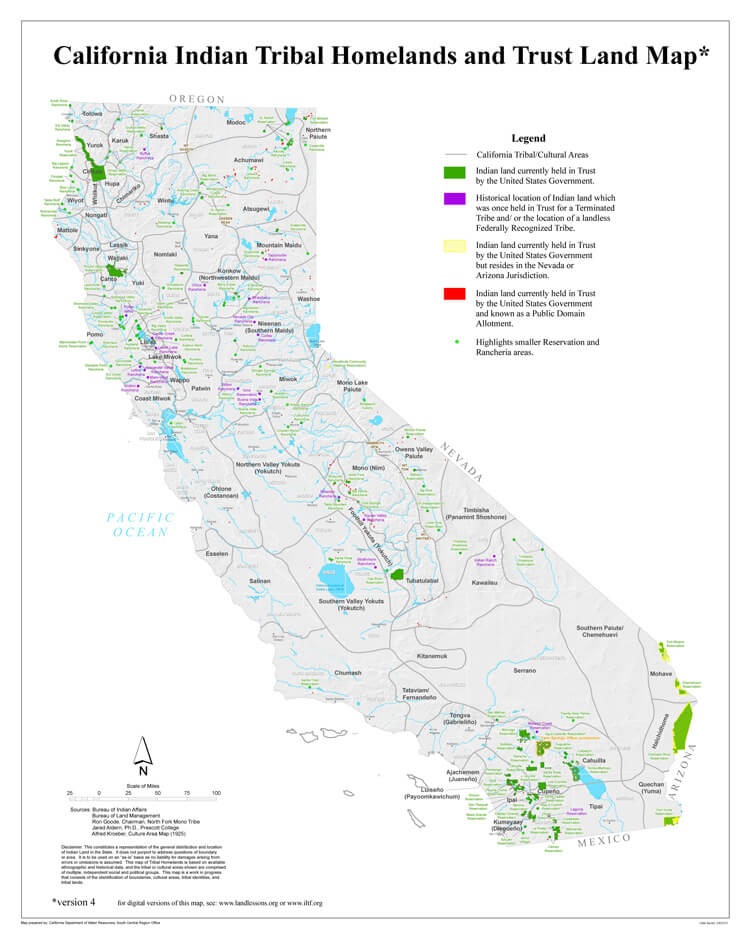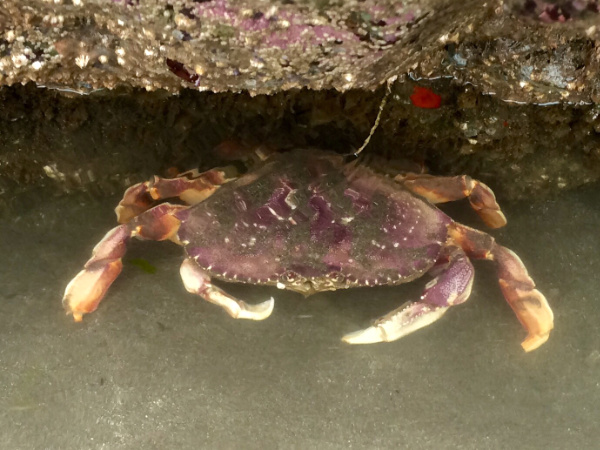California Tribes and tribal governments are the traditional users and stewards of California’s marine resources. Partnerships with Tribes and tribal communities are important to the Department and Commission to sustainably manage California’s ocean fisheries. Working in close coordination with the Commission’s Tribal Committee, the Department is committed to considering and incorporating traditional knowledge provided by engaged Tribes and tribal communities to successfully implement the Master Plan.
 The federal government recognizes more than one hundred Tribes within the State of California. The State of California also acknowledges numerous other Tribes and tribal communities that are not federally recognized. (Map prepared by California Department of Water Resources, South Central Region Office) View larger map
The federal government recognizes more than one hundred Tribes within the State of California. The State of California also acknowledges numerous other Tribes and tribal communities that are not federally recognized. (Map prepared by California Department of Water Resources, South Central Region Office) View larger map
The Department and Commission are demonstrating their growing commitment through issuance and adoption of policies that provide the foundation to work cooperatively, communicate effectively, and consult with Tribes. In 2011, the Governor issued Executive Order B-10-11(opens in new tab) directing state agencies to encourage communication and consultation with Tribes to allow meaningful input into the development of laws and policies that may affect tribal communities. This was followed in 2012 by the California Natural Resources Agency issuing its Tribal Consultation Policy (PDF)(opens in new tab). The purpose of that policy is to improve consultation and communication with Tribes and to promote durable outcomes by including Tribes throughout the decision-making processes of its Departments. The Department adopted its own Tribal Communication and Consultation Policy(opens in new tab) (Tribal Policy) in October 2014. The Tribal Policy is the foundation for the Department’s interaction with federally recognized Tribes and Tribes on the contact list maintained by the Native American Heritage Commission for purposes of tribal cultural resource protection. The purpose of the Tribal Policy is to establish effective tools for communication and consultation between the Department and Tribes.
Under the Tribal Policy, the Department seeks tribal input on its actions in order to identify potential issues, ensure to the maximum extent feasible that tribal interests are considered before undertaking actions, and avoid or minimize impacts whenever practicable.
 Dungeness crab. (Rob Jacob photo, CC BY-NC 2.0)
Dungeness crab. (Rob Jacob photo, CC BY-NC 2.0)
In October 2013, the Commission created the Tribal Committee as one of its working committees, to strengthen communication and collaboration between the Commission and California federally recognized Tribes and tribal communities. The Tribal Committee was tasked with the development of an effective government-to-government consultation policy to guide work between the Commission and Tribes on policies that affect California tribal communities. In July 2015, the Commission adopted its Tribal Consultation Policy that focuses on early communication and coordination rather than on formal consultation. This policy created a means by which Tribes and the Commission can effectively work together to sustainably manage natural resources of mutual interest.
 Surf smelt. (Rosa Laucci photo, CC BY-NC 2.0)
Surf smelt. (Rosa Laucci photo, CC BY-NC 2.0)
Photo at top of page: Looking north from the southern boundary of Pyramid Point State Marine Conservation Area in Del Norte County. (Rosa Laucci photo, CC by NC 2.0)